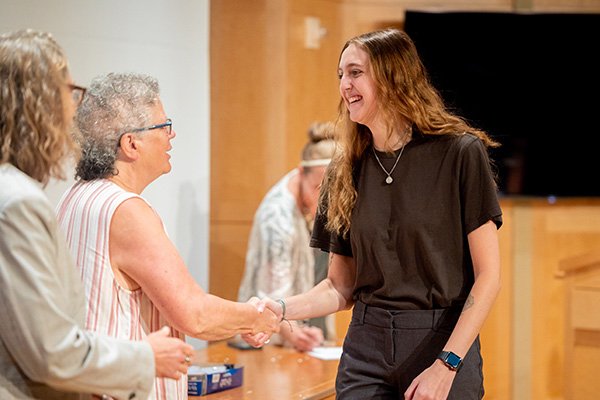
Connect With Faculty
Our Bachelor of Social Work (BSW) degree will prepare you to be a generalist social worker. You’ll learn how to understand people’s behavior and how they are affected by the world around them. You’ll also learn to partner with others as they overcome life challenges such as homelessness, addiction, and domestic violence, or as they negotiate life changes, such as illness, aging or unemployment. You will study and practice skills such as effective communication, critical thinking, and self-awareness so that when you graduate, you’ll be ready to apply these skills to build a more just society.
Our faculty are dedicated social work professionals and teachers, and our classes are small and personal. You’ll learn outside the classroom as well. As part of the curriculum, you’ll gain experience at a community agency such as a crisis line, domestic violence shelter or child welfare program. You’ll also complete a 400 hour field education practicum (internship), where you'll get hands-on experience in a professional setting.
After you apply to Central Michigan University, you can begin the process of admission into the social work program. There are two admission cycles every academic year. Current CMU students apply during the spring semester of their sophomore year and new transfer students with qualifying coursework apply during the fall semester.
The BSW degree is an accredited, four-year degree with which you as a graduate can obtain a professional license in Michigan and/or advanced standing for a master’s degree in social work (MSW). Qualified BSW graduates can earn a master's degree in as little as one year from MSW Programs in Michigan or across the country.
The mission of the Central Michigan University Social Work Program is to prepare students for generalist social work practice. Using a strong liberal arts foundation, the program develops and enhances critical inquiry and ethical practice with an emphasis on building relationships across difference, commitment to integrity and the professional competence of graduates. It provides students with the knowledge base and flexibility to pursue economic, environmental and social justice with diverse populations and in a global context. It promotes growth and empowerment of individuals, families, groups, organizations, and communities, as well as changes to social structures that oppress. The program responds to changing social contexts and practice modalities, with an emphasis on understanding the impact of rural and other environments on those served.
The Social Work Program prepares responsive and effective generalist social work practitioners to serve in Michigan and beyond, through the development of scholarship related to social work and societal needs, the promotion of service and a commitment to equity for our students and across society. (Updated December 19, 2022)
Undergraduate social work education focuses on training for generalist social work practice. The Council on Social Work Education defines generalist practice as listed below.
"Generalist practice is grounded in the liberal arts and the person-in-environment framework. To promote human and social well-being, generalist practitioners use a range of prevention and intervention methods in their practice with diverse individuals, families, groups, organizations, and communities based on scientific inquiry and best practices. The generalist practitioner identifies with the social work profession and applies ethical principles and critical thinking in practice at the micro, mezzo, and macro levels. Generalist practitioners engage diversity in their practice and advocate for human rights and social and economic justice. They recognize, support, and build on the strengths and resiliency of all human beings. They engage in research-informed practice and are proactive in responding to the impact of context of professional practice." (Council on Social Work Education, 2015 Educational Policy and Accreditation Standards)
The Central Michigan University Bachelor of Social Work (BSW) Program is accredited by the Council on Social Work Education’s Board of Accreditation (CSWE-BOA). The program received its initial accreditation in February 2004 and, in 2024, was reaffirmed through February 2032.
Accreditation of a baccalaureate or master’s social work program by the CSWE Board of Accreditation indicates that it meets or exceeds criteria for the assessment of program quality evaluated through a peer review process. An accredited program has sufficient resources to meet its mission and goals, and the Board of Accreditation has verified that it demonstrates compliance with all sections of the Educational Policy and Accreditation Standards (EPAS).
Accreditation applies to all program sites and program delivery methods of an accredited program. Accreditation provides reasonable assurance about the quality of the program and the competence of students graduating from the program.
There are more than 600,000 professional social workers in the United States. There are more clinically trained social workers than clinically trained psychiatrists, psychologists, and psychiatric nurses combined, and many more are needed.
If you're looking for an in-demand career that can provide you with meaning and satisfaction, social work is a great field to consider. You can learn more about social work opportunities by visiting the O*NET career resources website.
At CMU, you’ll get all the experiences and support you’ll need to graduate with confidence. If you’re eligible and opt in to the Central Career Guarantee we’ll even guarantee you’ll have a job offer or be accepted to grad school within six months of your graduation.*